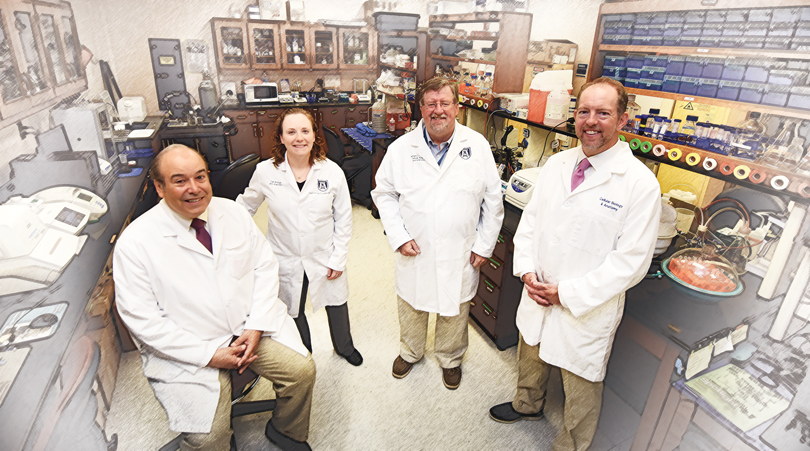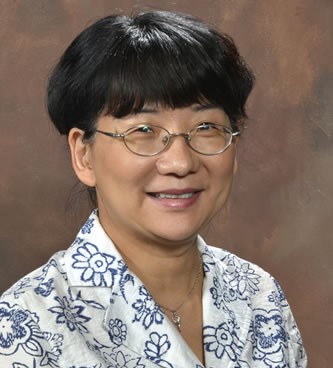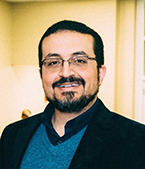
(from left) Program Project leads Drs. Isales, McGee-Lawrence, Hill and Hamrick

Dr. Jie Chen provides statistical bioinformatics and biostatistics support to the projects in the Center for Healthy Aging. Dr. Chen’s research interests include, but not limited to, statistical change point analysis, applied statistics, statistical inference, model selection criteria, statistics in bioinformatics, biostatistics, statistical modeling of high throughput genomic data and biomedical data. She is the leading author of the book entitled “Parametric Statistical Change Point Analysis: With Application to Genetics, Medicine, and Finance” (Birkhäuser, 1st edition 2000, 2nd edition 2012). In addition, Dr. Chen has rich collaborative research experience in molecular biology and bioinformatics. Her collaborative work has been published in Science, PNAS, Blood, AHA Circulations, Bioinformatics, BMC Bioinformatics, BMC Medical Genomics, Statistical Applications in Genetics and Molecular Biology, Journal of Computational Biology, Molcular and Cellular Endocrinology, etc. She has been a member of American Statistical Association (ASA) Caucus of Statistics Academic Representatives. Dr. Chen was elected an ASA Fellow in 2014 and is currently Editor-in-Chief of the Journal of Applied Statistics (a Taylor & Francis journal).

Dr. Mohammed Elsalanty is Professor at the department of Oral Biology and Diagnostic Sciences at the Dental College of Georgia and AU School of Graduate Studies. He holds joint appointment at the department of Oral and Maxillofacial Surgery at the Dental College of Georgia and the department of Cellular Biology and Anatomy at the Medical College of Georgia. Dr. Elsalanty received his MBBS (medical degree) from Cairo University in 1994 and his PhD in craniofacial biology from Texas A&M University in 2004. He also received a Masters degree in clinical and translational studies from the Department of Biostatistics at the Medical College of Georgia. Since 2007, his research resulted in 66 peer-reviewed publications in major refereed journals. Most recently, the research in his lab has focused on the role of matrix-bound bisphosphonate molecules in the pathogenesis of osteonecrosis in the oral cavity. He has served as Principal Investigator on awards from the National Institute of Dental and Craniofacial Research (NIDCR; R15) and the National Institute of Health (NIH; S10). He also served as co-investigators on multiple major NIH-funded projects. He has supervised several research projects in his field during the last 11 years, including three PhD, eight Masters, and several pre-doctoral and undergraduate projects. These projects have resulted in several publications by these students, as well as presentations at national meetings. His students have received multiple awards, including plenary sessions at the American Society of Bone and Mineral Research meeting, travel awards, and poster of the year at the National Honors Society. Dr. Elsalanty also received the 2017 Excellence in Teaching Award from the Dental College of Georgia.

Dr. Mark Hamrick's research in the Center for Healthy Aging focuses on the aging musculoskeletal system, specifically mechanisms of muscle and bone loss with aging. He has served as Chair of the Board of Directors for the National Association for Biomedical Research and served as a member of the Advocacy & Science Policy Committee for the American Society for Bone & Mineral Research. He currently serves as Section Editor for Muscle & Bone at Current Osteoporosis Reports and has previously served as editorial board member for the Journal of Bone & Mineral Research and Associate Editor at the Journal of Musculoskeletal & Neuronal Interactions. He is a member of the American Association of Anatomists, the Orthopaedic Research Society, the American Society for Bone & Mineral Research, and the Gerontological Society of America. His research on muscle and bone aging has resulted in more than 150 peer-reviewed research articles published in major refereed journals. He has received continuous funding for this research from the National Institutes of Health, the Department of Defense, and the National Science Foundation. This work has also been presented in the form of invited presentations at the National Institute on Aging, the Gordon Conference on Musculoskeletal Biology & Bioengineering, the American Society for Bone and Mineral Research, Duke University Medical Center, Johns Hopkins School of Medicine, the University of Chicago, Emory University School of Medicine, and the Programs in Musculoskeletal Research at Abbott, Amgen, Pfizer and Eli Lilly. In recognition of his research accomplishments he has been awarded the Outstanding Young Faculty Award and Outstanding Basic Science Research Award in the School of Medicine and the Distinguished Research Award from the College of Graduate Studies

Dr. Meghan McGee-Lawrence is an Associate Professor in the Department of Cellular Biology and Anatomy at the Medical College of Georgia at Augusta University. She received her PhD in Biomedical Engineering (emphasis in skeletal biomechanics) from Michigan Technological University and completed postdoctoral training in Cell / Molecular Biology at the Mayo Clinic in Rochester, MN. Dr. McGee-Lawrence serves as an Associate Editor for the Journal of Orthopaedic Surgery and Research (Springer Nature), and serves as a member of the Communications committee of the Orthopaedic Research Society, the Women in Bone and Mineral Research committee of the American Society for Bone and Mineral Research, and the Future Global Leaders committee for the International Federation of Musculoskeletal Research Societies. She is also an Ambassador for the National Osteoporosis Foundation, and has served on the Skeletal Biology Development and Disease (SBDD) study section for the National Institutes of Health. Dr. McGee-Lawrence’s research focuses on the roles of epigenetics, hormone signaling, and mechanobiological changes in skeletal degeneration during aging. In particular, the goal of her research program is to understand mechanisms involved in the maintenance and regeneration of bone structure and biomechanical strength, and uncovering the integrative physiological mechanisms by which the skeleton interacts with other body systems like fat and muscle. This program emphasizes epigenetic and mechanobiological therapeutic targets for skeletal treatment, mechanical competence of tissue, and pathways involved in skeletal communication, and has produced more than 60 peer-reviewed research articles published in major refereed journals. Dr. McGee-Lawrence is currently a Principal Investigator on research funded by the NIH National Institute on Aging, the National Science Foundation, and the American Diabetes Association.